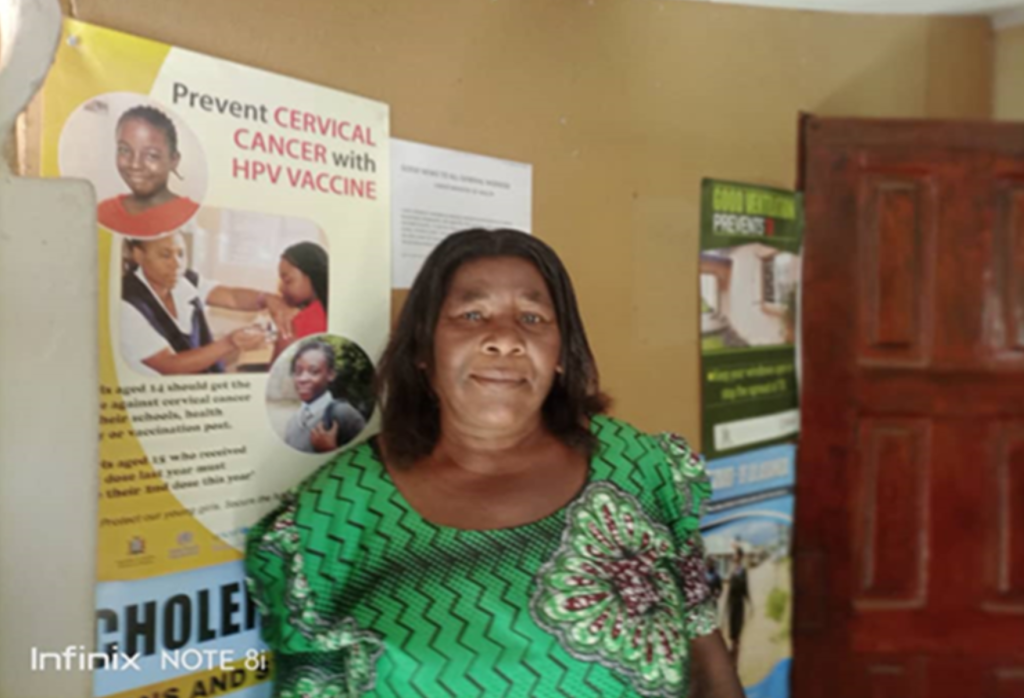Supporting Mothers in Zambia to Access Essential Healthcare
Published on October 9, 2024
By Jully Chilambwe, Francis Kaira, Alex Mubanga, and Paul Sunga, MOMENTUM Country and Global Leadership, Zambia

Year after year, Theresa Banda witnessed women in her community deliver their babies at home. They always had reasons for the risky choice: The health facility was too far away, transportation wasn’t available, they didn’t have clothes for the baby, or they had no one to watch their other young children.
But there were grave dangers, too.
Theresa, a mother of four and grandmother of five, knew childbirth does not always go as planned and complications at home can prove deadly for mom, baby, or both.
That’s why Theresa decided to volunteer with the Safe Motherhood Action Group (SMAG) connected to her local health center, Location Health Center in Northern Zambia’s Kasama District. Operating at the community level, SMAGs help women and families seek and access maternal and newborn care at health facilities. Members share essential information on safe motherhood to men and women, including the benefits for pregnant women to seek timely antenatal, delivery, and postnatal care. They also help identify maternal and newborn complications, offer first aid care, and refer women to health facilities.
In Zambia, about 15% of live births still take place at home.1 In 2022, a MOMENTUM-supported review of data at the Location Health Center identified home deliveries as a major driver of maternal and neonatal mortality in the area. Five women in the community died in 2022 after suffering pregnancy-related complications during home deliveries— this number does not include unreported maternal deaths.
To address this concern, MOMENTUM Country and Global Leadership provided onsite orientation to Location Health Center staff on the development of a quality improvement (QI) project focused on reducing home deliveries. The project began in August 2022 and was centered on revamping SMAGs in the community.
“As SMAGs, we were engaged in the project, and then we started holding community sensitization meetings on the dangers of giving birth at home,” said Theresa. “Males and community leaders such as headmen and civic leaders are involved. We regularly give health education to women during antenatal [visits]. Our nurses allocate pregnant mothers to SMAG members for follow-up.”
As a result of this intervention, Location Health Center was able to document a reduction in home deliveries by half in eight months, from 68 percent of births occurring at home in October 2022 to 35 percent in May 2023.
These results from Location piqued the Kasama District Health Office’s interest in the QI project. MOMENTUM subsequently trained 14 supervisors on QI principles, including how to analyze performance gaps and implement impactful interventions. These 14 supervisors then facilitated QI training for 22 of 43 health centers in Kasama. These facilities are now running QI projects addressing reproductive, maternal, newborn, child, and adolescent health (RMNCAH) and HIV indicators.
At the Location health facility, Theresa is proud of the work she and her fellow volunteers are doing to help keep pregnant women and newborns safe from maternal and child health complications.
“We have seen a significant change from the time we were oriented and started providing information and education to mothers on the importance of hospital deliveries,” said Theresa. “I have seen firsthand the difference we can make when we come together as a community to ensure safe childbirth. Witnessing these positive outcomes fills me with pride and strengthens our commitment to continue supporting pregnant women and newborns, even if it means sometimes escorting these mothers to the hospital for deliveries.”
MOMENTUM currently supports 623 facilities in 23 districts in Zambia, which represents 20 percent of all districts. The overarching goal is to improve RMNCAH services in Zambia’s Northern and Central provinces through increasing availability of and access to quality RMNCAH services, increasing demand for and uptake of RMNCAH services, and strengthening health systems at the national and sub-national level for effective RMNCAH service delivery.
Reference
- Zambia Statistics Agency – ZSA, Ministry of Health – MOH, University Teaching Hospital Virology Laboratory – UTH-VL, and ICF. 2020. Zambia Demographic and Health Survey 2018. Lusaka, Zambia: ZSA, MOH, UTH-VL and ICF. Available at https://www.dhsprogram.com/pubs/pdf/FR361/FR361.pdf.

